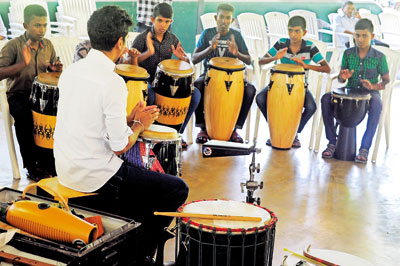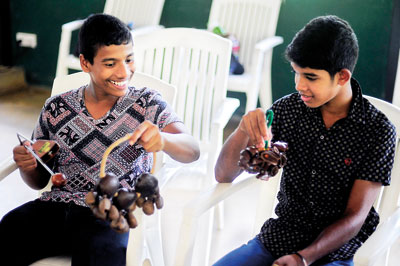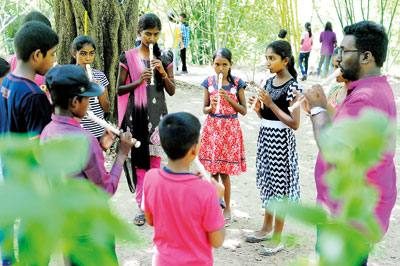Arts
Here music is the food of harmony

Getting into the beat with some expert guidance from a member of Naadro. Pix by Amila Gamage
The power of communication is not fully understood until one is serenaded by a group of students playing ‘Mary had a Little Lamb’ on their recorders. These young musicians grabbed my face to get my attention each jostling with the other to play their own version of the famous nursery rhyme for the journalist from the big paper. I was floored.
The Music Project, a programme aimed at uplifting the lives of the children from the north and the south through the power of music produced an orchestra before my eyes like I’ve never seen before. Inspired by El Sistema of Venezuela the project currently works with 350 children from the north and south, aged 8 and 9 years progressing from recorder to violin, cello, flute, trumpet, guitar and a variety of percussion.
A carefully structured programme that has been operating for the past five years, The Music Project hosts bi-weekly classes in schools with carefully trained teachers and volunteers. The children are then given the opportunity to take part in a public performance. Music is a link language between the north and the south and two day workshops are also held around twice a year.
This workshop at Anuradhapura hosted children, parents and teachers from Mullativu and Kurunegala. Around 150 children milled around, the groups getting bigger and bigger as they poured into the hall, the excitement almost tangible. The programme started with an ice breaker of the good ol ‘Duck Duck Goose’ to the communal groan of the kids.
Chairperson and driving force behind the movement Shalini Wickramasuriya has worked in education all her life. Being a mother herself she revels in watching her children play a variety of instruments. Wanting the same opportunity for the children of our country Shalini helped launch the project after being inspired by international projects in Venezuela.
The Music Project follows the Suzuki method of teaching a curriculum and philosophy that dates back to the mid-20th century, created by Japanese violinist Shinichi Suzuki. This holistic, therapeutic method allows children to enjoy the music at their own pace, allowing them to thrive without pressure and Shalini adds to ultimately “give them joy”. The ultimate methodology being simply “fun”.

Trying out some new rhythms and below, recorder practice
Each child has two lessons a week and Shalini’s aim for The Music Project is to alleviate the stress and expectations placed on children in their learning environment. “Empowerment, Self-study and Confidence”– these are the three values taught by the programme, Shalini states. She beams when she speaks of the two viola players from Kurunegala who were inducted into the Symphony Orchestra.
It is challenging to organise music specialists to teach the music programme. Thus, the workshops are hosted to bring in specialists for around one or two days. Past workshops have hosted specialists such as Jack Coward (music teacher at Wells Cathedral School in the United Kingdom), Rosenna East (violinist for the Scottish Chamber Orchestra) and the Worldship Orchestra which performed the French “Can Can” with the children.
This time around it was Sri Lankan drum ensemble Naadro who took time off their busy schedules to perform for and teach the children.
An excited but fatigued father who had been travelling all the way from Mullaitivu said this Friday was his 12-year-old’s first time and he was “willing to come as his son was so excited to participate”. A government school English teacher himself he greatly values and appreciates the effort and support the programme gives his family.
On the other side of the hall a group of mothers sit side by side watchfully observing their brood.The only way to distinguish them is by the stark red pottu some wear on the middle of their foreheads proudly depicting their ethnicity but humbly sharing a space with just another mother from a different background.
Two mothers from Kurunegala, M. Seneviratne and Kumudu Batagalla, excitedly spoke of the doors that open for their children through the programme. Their children both 13 specialize in the violin and flute. M. Seneviratne added that her child shows great excitement in gaining knowledge and learning something new.

In terms of reconciliation the mothers from north and south although unable to understand each other’s language communicate through facial expressions and kind gestures.
That afternoon the reverberating rhythms of the drum workshops had the usually noisy children speechless. Naadro’s director Asoka Wickramaratne told us the band is made up of Royal College old boys who have been in business for 10 years. They played free and seemed to be having as much fun as the children, each member getting into the collective performance.
With The Music Project since 2013 Saluka Kotagama is now on board full time. With years of coming for workshops the people have found a sense of “familiarity and respect for each other’s communities,” she says. “Music helps children to focus, develop themselves academically and instils a passion in them that cannot be broken,” Saluka adds.
Twenty-four-year- old cellist Thakshala, teaches the children the recorder. “We have to really work the children, support them and push but at the end of the day it’s worth it,” she says.
Trying to hide behind his recorder and avoid eye contact 13-year- old Pasindu Bandara Kulatilaka has been with The Music Project from day one. Hailing from Kurunegala, he has travelled to Jaffna, Galle, Killinochchi and Colombo, every experience exposing him to new adventures and bringing him out of his shell.
Naomi Kunimoto, the only international volunteer (she’s from Japan) has been a volunteer for two months and finds her students “very persevering and determined.” “You don’t need to speak to understand,” Naomi who speaks cohesive Sinhala says. Her students bewildered by the fact that the Japanese alphabet doesn’t have the ‘L’ letter overwhelm her with questions of how she pronounces ‘L-Words’.
With the day winding down, the rhythm of the drum workshops echoes around the Sevalanka farm in Anuradhapura while a choral group of recorders launch into their thousandth practice of ‘Mary had a Little Lamb.’ They come together as a unified orchestra and prove that each one has a role to play in this community.
With aid and support given by organizations such as JICA (Japan International Cooperation Agency) and Beyond Skin, The Music Project continues to thrive in its quest for harmonious equilibrium.

